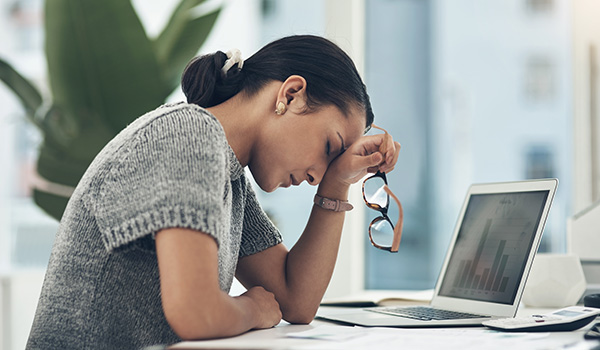
Although there is no foolproof way to avoid all viruses and bacteria, there are some things you can do to reduce your chances of becoming ill during flu season — and all year long. Here are five major reasons why employees get sick, as well as preventative measures that can be implemented.
Going to work sick
The main reason employees get sick is because they come into contact with germs at work. A recent study discovered that a sick employee can spread germs to up to 60% of commonly touched surfaces in the workplace in just four hours, significantly increasing the likelihood that an illness will spread to coworkers. Even if you didn’t touch anything at work, which is highly unlikely, your illness could be spread through close conversation, sneezing, or coughing. Companies can help prevent the spread of germs by providing paid sick leave and encouraging employees to use it.
Stress
Stress has been shown to wreak havoc on the immune system. If you are overly stressed, you are much more likely to become ill. Making time to de-stress and care for yourself is a great way to avoid getting sick not only during flu season but all year.
Some effective stress management and coping strategies include:
- Deep inhalation
- Going outside
- Eating nutritious, well-balanced meals
- Having a conversation with a friend
- Getting enough rest
Lack of sleep
Sleep deprivation has been shown in studies to have a negative impact on the immune system. To make matters worse, not getting enough sleep makes it difficult for your body to recover. In other words, our bodies require adequate sleep time to effectively combat infectious diseases.
Lack of adequate hand washing
Either employees don’t wash their hands when they are supposed to or they aren’t sure how to do it properly. The CDC has provided instructions on how to properly wash your hands.
- Wet your hands with clean, running water (warm or cold), then apply soap.
- Rub the soap into your hands to make a lather. Massage the backs of your hands, between your fingers, and under your nails with the soap.
- Rub your hands together for at least 20 seconds. You can either set a timer or you can hum the “Happy Birthday” song from beginning to end twice.
- Rinse your hands thoroughly with clean, running water.
- Dry your hands with a clean towel or let them air dry.
Ideally, you should wash your hands before and after preparing and eating food, as well as after using the toilet, blowing your nose, coughing, or sneezing, touching an animal, and touching garbage.
Lack of proper sanitizing
Employees may share desks in some cases, so make sure you clean your desk and everything you’ve touched, including your keyboard, mouse, drawer handles, and chair. When cleaning your electronics, make sure to use disinfectant or antimicrobial wipes (keyboard, laptop, desktop, mobile phone).
Why Employees Get Sick conclusion
Being aware of the various ways employees get sick will help employers adopt practices that will protect their employees. Providing paid sick leave will help keep all other employees and customers safe and it’ll save the company money in the long run. While at work hand washing and washing surfaces is also a great way to keep germs from spreading throughout the company. Lastly, sleep and reducing stress can greatly decrease the susceptibility of getting sick.

